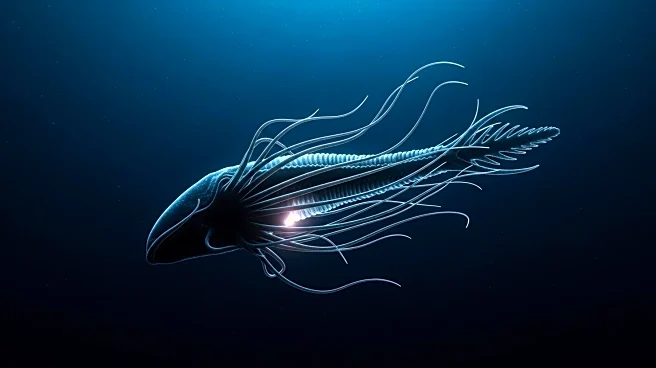What is the story about?
What's Happening?
A team of scientists has discovered a new deep-sea predator, Dulcibella camanchaca, in the Atacama Trench. This shrimp-like amphipod, measuring about 4 centimeters, is unique enough to warrant the creation of a new genus. Unlike many deep-sea creatures that scavenge, Dulcibella camanchaca actively hunts other amphipods using its specialized appendages. The discovery was made during the 2023 Integrated Deep-Ocean Observing System Expedition, led by Chile's Instituto Milenio de Oceanografía. Four specimens were collected at a depth of 7,902 meters using a free-fall lander, allowing for detailed morphological and genetic analyses. This finding highlights the vast unknown biodiversity in the deep ocean and the importance of continued exploration.
Why It's Important?
The discovery of Dulcibella camanchaca underscores the significance of deep-sea exploration, particularly as interest in deep-sea mining grows and climate change impacts ocean ecosystems. Identifying a new genus is akin to finding a new branch on the evolutionary tree, emphasizing how much remains undiscovered about Earth's biodiversity. This discovery strengthens the case for conservation efforts in the deep ocean, as these ecosystems may be at risk of damage before they are fully understood. The adaptability and unique characteristics of Dulcibella camanchaca serve as a reminder of the resilience and complexity of life in extreme environments.
What's Next?
The discovery of Dulcibella camanchaca may prompt further deep-sea exploration and research to uncover more unknown species and understand their roles in the ecosystem. As scientists continue to explore the hadal zone, they may discover additional unique species, which could lead to new insights into evolutionary biology and biodiversity. Conservationists may use this discovery to advocate for protective measures against deep-sea mining and other activities that could harm these fragile ecosystems. The scientific community is likely to push for more funding and resources to support deep-sea research initiatives.
Beyond the Headlines
The discovery of Dulcibella camanchaca raises ethical questions about the impact of human activities on unexplored ecosystems. As deep-sea mining and other industrial activities expand, there is a growing need to balance economic interests with environmental conservation. This discovery also highlights the potential for new scientific knowledge and technological advancements that could arise from studying these unique organisms. The cultural significance of exploring the unknown and the human drive to understand our planet's mysteries are also underscored by this finding.

















